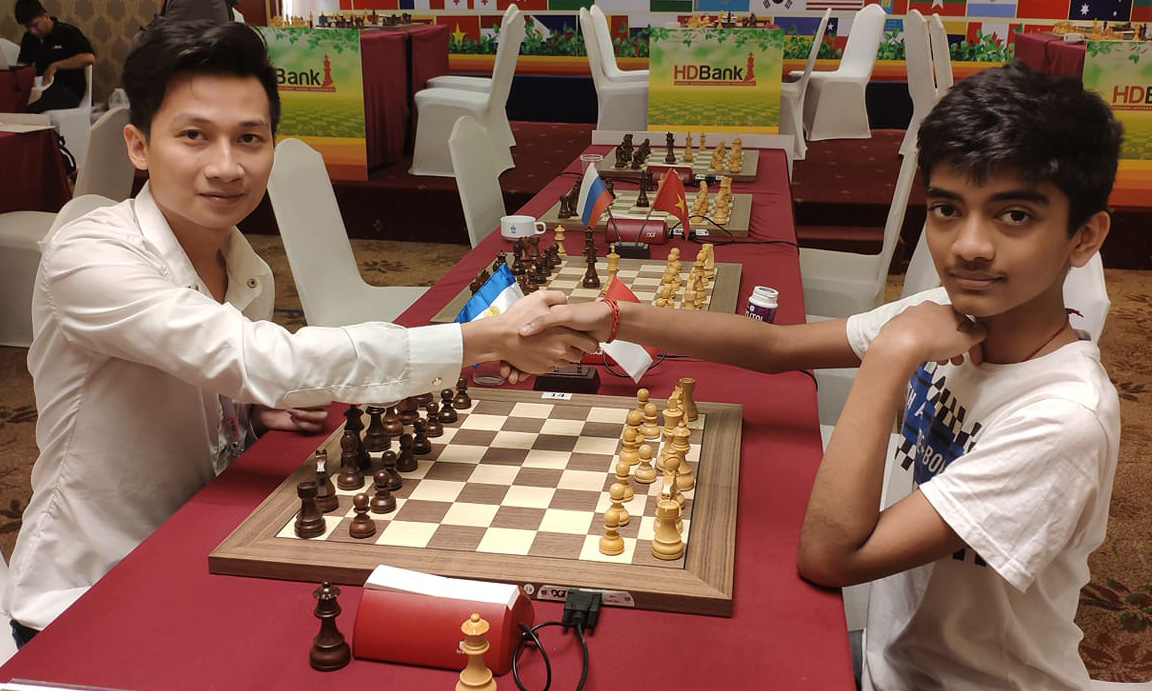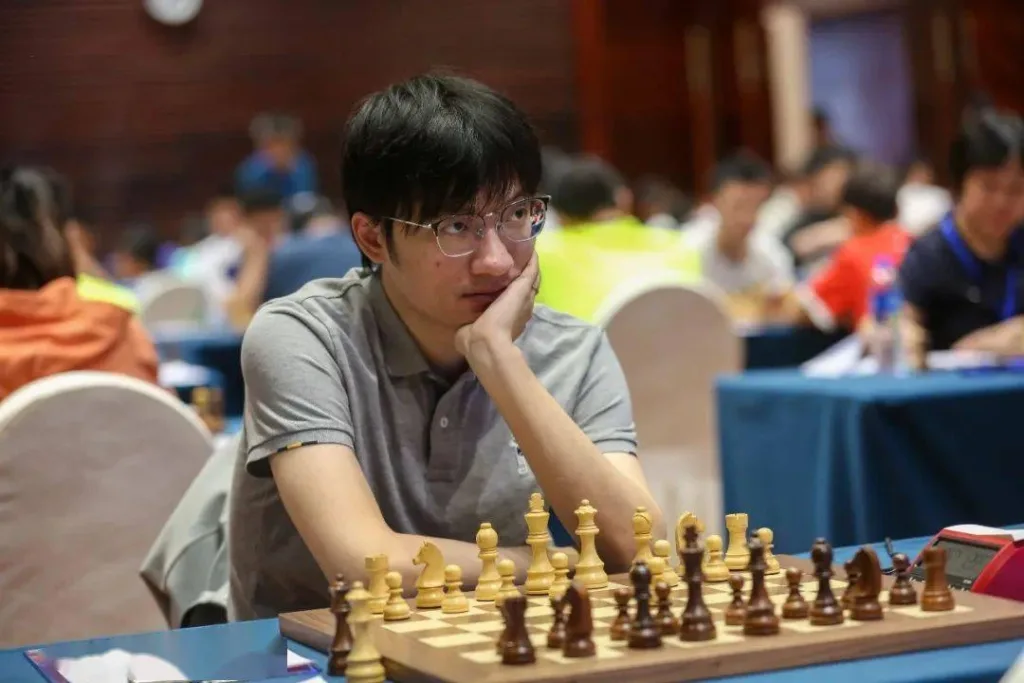Zeng Chongsheng, born in 1993 in Chenghai, Guangdong, is one of the few international grandmasters in China to combine an active professional career with long-term dedication to coaching. Over two decades, he has built parallel legacies: on one side, a player who has won national and international tournaments; on the other, a teacher who has shaped the lives of hundreds of young chess players. His own reflections on teaching and his students reveal a career driven less by titles than by responsibility.
Early Beginnings
Zeng first encountered chess in unusual circumstances. At age seven, he began learning not out of love for the game itself, but because his younger brother was already excelling. As he later recalled:
“I got involved in chess not because I particularly liked it, but because I had a younger brother who was a genius at chess. I envied him for having many chess friends, and we could play happily together, so I started learning chess.”
His younger brother attracted sponsors at the age of seven, while Zeng was considered a late starter. Yet this seemingly “tragic” beginning gave him freedom from the crushing expectations that often burden young prodigies. By age eight, Zeng won the Guangdong Provincial Championship with a perfect 9/9 score, proving his potential.
Climbing Toward Grandmaster
After joining the National Youth Team in 2005, Zeng began pursuing international opportunities. In 2010, he scored two GM norms at the Asian Individual Championship in the Philippines. In 2011, he secured his final norm at the Chennai Open in India.
His decisive breakthrough came in March 2013 at the HD Bank Cup in Ho Chi Minh City, Vietnam. In the last round, he defeated Wei Yi, then already a national sensation. The victory raised his rating past 2500, fulfilling all requirements for the grandmaster title.
Yet even then, Zeng’s path was shaped by constraint. “At 17, I had three Grandmaster norms, but my rating was only 2300+. Because I did not have the financial ability to participate in tournaments, my rating only reached 2400 at 19, and I only became a Grandmaster at 20.” The struggle for resources defined his early years.
National and Team Success
Zeng has been a consistent competitor in domestic events. He placed seventh in the 2018 National Rapid and Blitz Championship, and from 2022 he became a pillar of the Chongqing Sports Lottery team in the Chinese Chess League.
In 2023, Chongqing won the CCL First-Class League, with Zeng also taking the Group A championship at the 3rd Binhai New Area Cup. In 2024, he repeated success, leading Chongqing to the A-League title after a 6–0 final victory over Beijing. At the same time, he acted as leader of the Shenzhen Chess Culture Team, guiding them into the A-League for the following season.
International Victories
In 2025, Zeng traveled to Austria and delivered two of his best performances abroad. In Linz, he won the open ahead of compatriots Xie Kaifan and Chen Qi. A few days later, he captured the Graz International Open.
Seeded third among 226 players from 43 countries, Zeng went undefeated. His critical win came in round six, when he beat 16-year-old Ukrainian prodigy Samunenkov with Black. He then drew three games against experienced opponents and emerged champion on tiebreaks.
The Graz Open has been a launchpad for several Chinese stars in past years. Zeng’s victory added him to that tradition while showing that, even at 32, his playing career remains strong.
The Teacher’s Philosophy
More than his titles, Zeng’s reflections on education have defined his reputation. In a 2023 essay marking his ten years of teaching, he wrote:
“Ten years have flown by in the blink of an eye. Over these ten years, I’ve witnessed children’s successes, failures, perseverance, and resignation on their chess journeys. I’ve also experienced the changing mindsets of parents, from curiosity to pride, from high hopes to confusion, and finally endless anxiety. Many parents have asked me what the right path is. Clearly, this is a question of perspective, much like playing chess. A misguided, utilitarian mindset in learning chess is like a misdirected attack plan on the chessboard, leading to a complete loss.”
For Zeng, coaching has always rested on three principles: hobby, cultivation, and persistence.
- Hobby: Chess must begin with enjoyment. “Looking back, I realize how important it is to stay true to my original aspirations and not be obsessed with academic performance.”
- Cultivation: Strict discipline and tenacity are equally necessary. “A strict teacher like a father was so important. Because I loved to play the most, I would often be beaten and scolded by the teacher. Fortunately, I also have an equally strict father, who instilled in me the spirit that a man should have since I was a child.”
- Persistence: Every child’s growth process is different. “They may appear mediocre, with unremarkable grades, yet deep down they maintain a genuine heart, as resilient as a boy. On their journey, they remain humble in success, yet persevere when they don’t. They deserve even greater praise.”
Relationship with Students: The Case of Xue Haowen
Among Zeng’s many students, Xue Haowen stands out. In 2023, Xue won the Li Chengzhi Cup, a youth event where Zeng himself had once excelled. For Zeng, the victory symbolized the continuity of generations. He proudly shared a photo with Xue and fellow grandmaster Yu Ruiyuan, describing them as “equally dedicated partners.”
This mentorship illustrates Zeng’s impact: he not only trains students technically but also instills humility. “I always tell them, including parents, to be humble and modest. Your every move impacts your child, and a temporary bow allows for a more vibrant blossoming future.”
Family, Sacrifice, and Identity
Perhaps the most personal passages of Zeng’s reflections concern his own childhood. He revealed himself to be Child C in a teaching story he often tells parents: a boy with talent, but whose family could not afford international tournaments. His parents, facing business struggles, silently supported him without complaint.
“My parents quietly supported my chess studies, but they didn’t have the financial resources to participate in major tournaments… To this day, my parents still feel guilty about me. But I want to say that it’s you, Mom and Dad, who have made me who I am today. I’m a man who holds myself accountable and a teacher who can teach so many children. I love you more than anyone else in the world. Without your silent dedication, I wouldn’t have a future.”
By age 16, Zeng was already teaching part-time to pay for his competitions. He describes this not as bravery but as necessity: “This wasn’t courage, but the fighting spirit instilled in me by my teachers and father as a child. I began a life that was half teaching and half competing.”
Role Model and Perspective
Unlike many grandmasters, Zeng no longer views his personal achievements as central. “Individual chess achievements were never my primary pursuit. Later on, all my personal accomplishments served only to enhance my persuasiveness in front of my children.”
He often cites his encounter with his idol, Alexander Grischuk, in the 2017 Chinese League as symbolic. Exhausted from accompanying students to Europe, he faced Grischuk while yawning at the board. The story, he says, illustrates how he has “long since let go of my dreams and kept my feet on the ground.”
Legacy and Evaluation
Today, Zeng Chongsheng represents a dual identity: an active grandmaster and a devoted teacher. His Graz Open win in 2025 confirmed that he still belongs among competitive international players. Yet his long-term impact may be deeper in coaching, where students like Xue Haowen carry forward his lessons.
Parents who bring their children to his club often note his responsibility and strictness. Zeng has repeatedly warned them not to treat chess as a mere stepping stone to academic advantage. Instead, he insists that chess like life, requires discipline, humility, and persistence.
His own story, from a late starter overshadowed by his brother to a grandmaster and mentor, gives weight to his words. “If I couldn’t meet my own expectations, I would close my club,” he once said. Instead, the club continues to produce champions, national masters, and, perhaps more importantly, individuals who have learned resilience from him.
At 32, Zeng remains both a competitor and a teacher. In modern chess, where specialization often forces players to choose one path, he has shown that it is possible to sustain both. His life embodies the values he preaches: play for love, train with discipline, and persist with humility.

I’m Xuan Binh, the founder of Attacking Chess, and the Deputy Head of Communications at the Vietnam Chess Federation (VCF). My chess.com and lichess rating is above 2300. Send me a challenge or message via Lichess. Follow me on Twitter (X) or Facebook.

